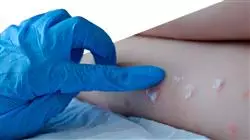University certificate
Scientific endorser

The world's largest faculty of nursing”
Introduction to the Program
Get up-to-date, in a 100% online format, on the latest advances and techniques in Comprehensive Pediatric Nursing, delving into aspects such as nutrition in non-digestive pathologies in the paediatric patient”

Nursing has undergone numerous advances and innovations in recent years, incorporating new tools and techniques in areas such as neonatology and in scholar fields. Therefore, the professional requires a complete and deep up- to-date that allows him/her to master the latest procedures of the discipline. It is in this context that the Advanced master’s degree in Comprehensive Pediatric Nursing arises, an academic program that provides a complete and immediate up-to-date to the student.
Pediatric Nursing is an area that covers various subspecialties such as School Nursing, Neonatal Nursing or Pediatric Emergencies, among others. Thus, in this Advanced master’s degree the professional will have the opportunity to delve into the latest advances in the most important disciplines of Nursing, mastering aspects such as the admission process of the newborn in the Neonatology Service, dermatological emergencies or the application of vaccines.
One of the highlights of this program is its 100% online methodology, which allows students to make their learning experience more flexible, adapting the academic itinerary to their own schedules. In addition, the nurse will have access to a wide variety of multimedia resources, such as in-focus videos and interactive summaries that will allow them to deepen their knowledge of the subjects in a dynamic way.
This Advanced master’s degree will allow you to update you completely and immediately in areas such as School Nursing or Pediatric Emergencies”
This Advanced master’s degree in Comprehensive Pediatric Nursing contains the most complete and up-to-date scientific program on the market. The most important features include:
- The development of practical cases presented by experts in Pediatric Nursing
- The graphic, schematic, and practical contents with which they are created, provide scientific and practical information on the disciplines that are essential for professional practice
- Practical exercises where the self-assessment process can be carried out to improve learning
- Special emphasis on innovative methodologies in Pediatric Nursing
- Theoretical lessons, questions to the expert, debate forums on controversial topics, and individual reflection assignments
- Content that is accessible from any fixed or portable device with an Internet connection
Through this program you will master the most advanced nursing procedures: from the latest techniques in neonatal life support to artificial nutrition techniques”
Its teaching staff includes professionals from the field of Nurses, who bring to this program the experience of their work, as well as recognized specialists from reference societies and prestigious universities.
The multimedia content, developed with the latest educational technology, will provide the professional with situated and contextual learning, i.e., a simulated environment that will provide an immersive learning experience designed to prepare for real-life situations.
This program is designed around Problem-Based Learning, whereby the student must try to solve the different professional practice situations that arise throughout the program. For this purpose, the professional will be assisted by an innovative system of interactive videos made by renowned experts.
Accompanied by a teaching staff of great prestige in the area of Pediatric Nursing"

Enroll now and update yourself with the most advanced multimedia resources: interactive summaries, in focus videos and practical activities, among others"
Why study at TECH?
TECH is the world’s largest online university. With an impressive catalog of more than 14,000 university programs available in 11 languages, it is positioned as a leader in employability, with a 99% job placement rate. In addition, it relies on an enormous faculty of more than 6,000 professors of the highest international renown.

Study at the world's largest online university and guarantee your professional success. The future starts at TECH”
The world’s best online university according to FORBES
The prestigious Forbes magazine, specialized in business and finance, has highlighted TECH as “the world's best online university” This is what they have recently stated in an article in their digital edition in which they echo the success story of this institution, “thanks to the academic offer it provides, the selection of its teaching staff, and an innovative learning method aimed at educating the professionals of the future”
A revolutionary study method, a cutting-edge faculty and a practical focus: the key to TECH's success.
The most complete study plans on the university scene
TECH offers the most complete study plans on the university scene, with syllabuses that cover fundamental concepts and, at the same time, the main scientific advances in their specific scientific areas. In addition, these programs are continuously being updated to guarantee students the academic vanguard and the most in-demand professional skills. In this way, the university's qualifications provide its graduates with a significant advantage to propel their careers to success.
TECH offers the most comprehensive and intensive study plans on the current university scene.
A world-class teaching staff
TECH's teaching staff is made up of more than 6,000 professors with the highest international recognition. Professors, researchers and top executives of multinational companies, including Isaiah Covington, performance coach of the Boston Celtics; Magda Romanska, principal investigator at Harvard MetaLAB; Ignacio Wistumba, chairman of the department of translational molecular pathology at MD Anderson Cancer Center; and D.W. Pine, creative director of TIME magazine, among others.
Internationally renowned experts, specialized in different branches of Health, Technology, Communication and Business, form part of the TECH faculty.
A unique learning method
TECH is the first university to use Relearning in all its programs. It is the best online learning methodology, accredited with international teaching quality certifications, provided by prestigious educational agencies. In addition, this disruptive educational model is complemented with the “Case Method”, thereby setting up a unique online teaching strategy. Innovative teaching resources are also implemented, including detailed videos, infographics and interactive summaries.
TECH combines Relearning and the Case Method in all its university programs to guarantee excellent theoretical and practical learning, studying whenever and wherever you want.
The world's largest online university
TECH is the world’s largest online university. We are the largest educational institution, with the best and widest online educational catalog, one hundred percent online and covering the vast majority of areas of knowledge. We offer a large selection of our own degrees and accredited online undergraduate and postgraduate degrees. In total, more than 14,000 university degrees, in eleven different languages, make us the largest educational largest in the world.
TECH has the world's most extensive catalog of academic and official programs, available in more than 11 languages.
Google Premier Partner
The American technology giant has awarded TECH the Google Google Premier Partner badge. This award, which is only available to 3% of the world's companies, highlights the efficient, flexible and tailored experience that this university provides to students. The recognition as a Google Premier Partner not only accredits the maximum rigor, performance and investment in TECH's digital infrastructures, but also places this university as one of the world's leading technology companies.
Google has positioned TECH in the top 3% of the world's most important technology companies by awarding it its Google Premier Partner badge.
The official online university of the NBA
TECH is the official online university of the NBA. Thanks to our agreement with the biggest league in basketball, we offer our students exclusive university programs, as well as a wide variety of educational resources focused on the business of the league and other areas of the sports industry. Each program is made up of a uniquely designed syllabus and features exceptional guest hosts: professionals with a distinguished sports background who will offer their expertise on the most relevant topics.
TECH has been selected by the NBA, the world's top basketball league, as its official online university.
The top-rated university by its students
Students have positioned TECH as the world's top-rated university on the main review websites, with a highest rating of 4.9 out of 5, obtained from more than 1,000 reviews. These results consolidate TECH as the benchmark university institution at an international level, reflecting the excellence and positive impact of its educational model.” reflecting the excellence and positive impact of its educational model.”
TECH is the world’s top-rated university by its students.
Leaders in employability
TECH has managed to become the leading university in employability. 99% of its students obtain jobs in the academic field they have studied, within one year of completing any of the university's programs. A similar number achieve immediate career enhancement. All this thanks to a study methodology that bases its effectiveness on the acquisition of practical skills, which are absolutely necessary for professional development.
99% of TECH graduates find a job within a year of completing their studies.
Advanced Master's Degree in Comprehensive Pediatric Nursing
Pediatric nursing is a health specialty that requires specific knowledge and specialized skills to provide comprehensive and quality care to children and adolescents in their growth and development process. At TECH Global University, we have created an Advanced Master's Degree in Comprehensive Pediatric Nursing, with the objective of educating nurses in the latest trends and practices in pediatric care. This online program offers comprehensive and up-to-date training in areas such as neonatal care, pediatric intensive care, chronic diseases in childhood, nursing care in community pediatrics, among other relevant topics.
The Advanced Master's Degree in Comprehensive Pediatric Nursing at TECH Global University is based on a practical and evidence-based approach, which allows nursing professionals to apply the competencies learned in their daily work. In addition, the graduate program has great benefits such as the flexibility of being able to regulate your own schedule and access specialized multimedia content from anywhere. We also have an excellent faculty versed in the field of nursing and cutting-edge educational methodologies that will allow you to capture more knowledge in less time. Do you want to excel in your professional career? Enroll at TECH







